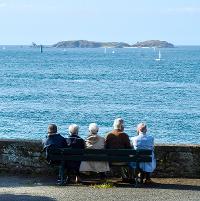When asked about the biggest challenge facing us globally, Mick Smyer, Founder and CEO of the American non-profit organisation, Growing Greener, didn't miss a beat: "Ageing in an era of climate change," he answered. "It resonates both at the individual and the societal levels."
This seemed like the perfect way to sum up the panel discussion I attended at The 2021 Longevity Week, an annual conference addressing the challenges of ageing societies. Hosted by Encore Fellows UK, the panel looked at the role of social entrepreneurship in supporting the nexus between longevity, ageing and the environment.
Here are five ways innovative products, services and programmes can contribute to healthy and sustainable lives:
1. Older people can be leaders on climate change. The premise behind Growing Greener is that older adults are uniquely well-positioned to harness their time, experience and talent in combating the climate crisis. Unlike younger generations, who learn about climate change in school, older adults typically learn about it through the (often biased) media. Growing Greener has thus created a set of educational materials—including workshops, presentations and customised training materials—to educate individuals and organisations about climate change. Armed with that knowledge, older adults can then go out and talk about the climate crisis within their circles of influence. (Data indicate that only 37 percent of Americans discuss global warming frequently with family members and friends.) The next step is to help these individuals identify the unique skills and talents they bring to solving this problem, so they can take simple steps towards engagement, whether through policy, the arts or being more energy efficient at home.
2. It's never to late to join the gig economy. Labora Tech is an HR start-up located in Brazil. Its platform matches the workforce challenges identified by partner companies with the hard and soft skills of older workers, providing additional training where needed. Co-Founder and CEO Sergio Serapiao described one project in Brazil where older workers have been deployed to one of the country's largest banks to teach other seniors how to use mobile banking. All of Labora Tech's projects are built on the premise that the much-touted global push for greater diversity in the workforce needs to encompass generational diversity as well.
3. From 'age friendly' to 'longevity ready.' As we increasingly come to terms with the demographic realities of a globally ageing population, Stanford University's Center for Longevity is seeking to reshape the narrative around this "new map of life." The idea is to create an environment that's conducive to healthy ageing across the lifespan. This requires innovations to tackle everything from reducing the amount of airborn toxins pregnant women are exposed to at birth, to creating more green spaces for children as they grow, to looking at the impact of excessive heat on the mental health of older adults. In short, it's all about how the built environment and climate interact to secure century-long lives.
4. Climate communication matters. In sharing what he's learned about climate change communications, whether with young kids or older adults, Mick Smyer reduced it to three words: "social, short, and positive." Keeping it social means anchoring your message around people and places your audience cares about, so they are motivated to act. Keeping it short means limiting your focus to a human-scale time frame (i.e., what you can do in your own lifespan) so that people don't switch off and think the problem is beyond their grasp. Finally, keeping it positive means teaching people very simple, actionable next steps they can enact right away to tackle climate change.
5. Intergenerational cooperation is key. As we seek to debunk the notion of a generation gap in climate change, intergenerational cooperation is vital. Sergio Serapiao described a project in Taiwan in which a pair of workers—one old, one young—measured how much energy households were using in different neighbourhoods. These "guardians of the environment," as he called them, were then tasked to engage with residents to find out why some households were spending more than their neighbours, and to help them to find a more energy-efficient solution. Marie Conley Smith coordinates the Stanford Center on Longevity Design Challenge, an annual competition where university students across the globe design products and services to foster long life. She described one project called Near, for example—which enables family members, especially those who live far from their loved ones—to communicate with each other and receive updates through an app. Both the older family members and their carers are trained in how to use this service, which staves off loneliness and fosters connection across the generations.
Mick Smyer believes the environmental space is well-suited to social entrepreneurship, as it enables older adults to "pay it forward." He concluded his remarks with one simple question: "How do you want to be remembered?" It's a question Growing Greener uses to motivate older adults to get more involved in shaping climate change opinion and behaviour.
So as long as I'm here, I thought I'd ask: How do you want to be remembered?
About the Author
Delia Lloyd is a Visiting Fellow at the Oxford Institute of Population Ageing. A seasoned writer and editor, she worked for a decade in radio, print and online journalism. Her reporting and commentary have been featured on outlets including The New York Times, The Washington Post, The Guardian and The BBC World Service.
Opinions of the blogger is their own and not endorsed by the Institute
Comments Welcome: We welcome your comments on this or any of the Institute's blog posts. Please feel free to email comments to be posted on your behalf to administrator@ageing.ox.ac.uk or use the Disqus facility linked below.













